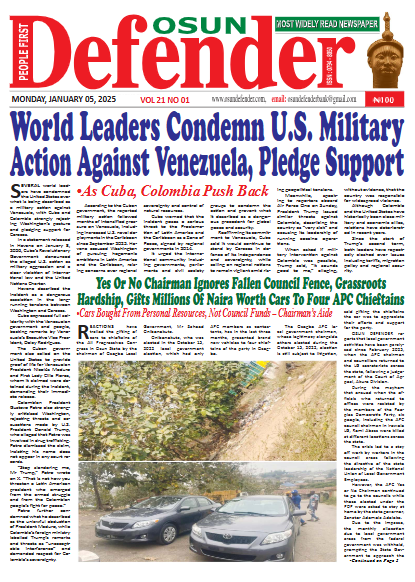Much as the crisis of confidence over the growing debt would seem a natural corollary to the severe strain in the nation’s public finance system in general, we hasten to warn about the terrible cynicism that seeks to severely constrict the options available to the governments across the federation to deal with crisis even when tough choices become inevitable.
We refer to concerns being expressed of late, not just about the hunger for debts but its sustainability. The clamour, across the board is that governments – federal and states – should not be allowed to pile up more debts. The argument here is that the debts have reached the level of sustainability. Although, Nigeria’s debt to GDP ratio currently standing at 19 per cent is said to compare with its peers across the globe, commentators readily point to the revenue-to-debt servicing-cost ratio, hovering around the 80 per cent mark, as rendering the prospects of additional loans quite problematic. We recall the Islamic Development Bank (IDB) representative in Nigeria, Abdallah Mohammed Kiliaki specifically putting the country’s revenue-to-debt servicing-cost of between 75 to 80 per cent to underscore why the country should be wary of new loans. A more telling illustration of the crisis is the N1.663 trillion allocated to debt service in the 2017 budget, representing a whopping 32.73 per cent of the total outlay.
We agree that the federal and the states have a lot of lessons to learn from the terrible mismanagement of past loans. Again, what we do not accept is that the situation should needlessly tie the hands of the managers of the economy from such options that are not only pragmatic but reasonable in the circumstances that the country has found itself.
The terrible reality of course, is that the country’s revenue is down. Today, the very infrastructures needed to get the economy up and running are in shambles. Our roads – whether inter-state or rural sorely needed to convey agricultural products to the market are virtually non-existent. Our electricity situation, currently precarious is in no position to fire the economy on all cylinders. Many of our industries are either dead or dying. School infrastructure, a veritable tool for creating the economy of the future require the fresh touch that only a serious government can bring to bear. The situation, to put it mildly, is grim.
What do we do? Do we simply foreclose the debt option simply because the country has had some nasty experience in the past? Should the federal and state governments fold their hands and hence do nothing, hoping against hope that revenue will somehow improve? What is so alarming or even esoteric about the so-called issue of revenue-to-debt servicing-cost that cannot be brought down by deliberate efforts in the medium term to grow the tax revenue? The real challenge is to ensure that debts are kept within responsible limits and are well deployed in such ways and manners to deliver value to the people. That way, it can pay its way.
Worth recalling in this regard is the needlessly acrimonious debate over whether or not the State of Osun should take the Sukuk Bond to upgrade its school infrastructure. Today, with the benefit of hindsight, the debate, given the massive upgrade in the public school system, has become, quite frankly, superfluous. Few years after the Rauf Aregbesola-led administration chose to plod on to the consternation of its critics, citizens currently shudder at what could have been, had the government not taken that bold and sensible option.
We agree that the debate on the debt is legitimate. Only that it should not be closed – or its aversion, a fetish.










